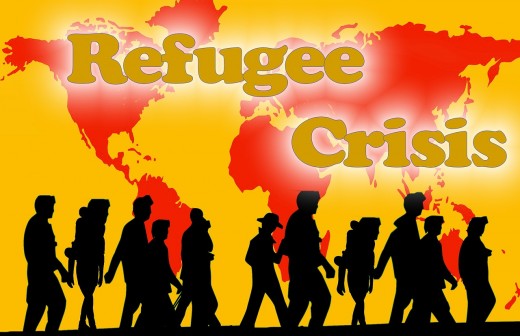Syrian Refugee Myths

The current hot topic is the Syrian refugee “crisis,” and the fact that several US State governors have refused to accept these refugees into their states. It is a very emotional issue, that appeals to people’s feel-good sense of charity, and as with all emotional issues, the facts often get trampled or ignored. (Which is why Rahm Emanuel said “You never let a serious crisis go to waste.” People are most emotional during and after a crisis, and common sense and reason don’t get in the way of agendas.)
There is specifically a lot of misinformation and public misconceptions concerning the Syrian refugees. In this article, I address some of these myths and misconceptions. Some of my information concerning refugees who have been brought to the US in recent years, I’ve gleaned first-hand, since for several years I worked with refugees from the nearby city of Utica, NY, which is the fourth largest refugee resettlement area in the country.
I don’t think that the Syrians are better or worse than any other refugee group that has been imported into this country. But eventually we will reach a tipping point, and the accumulative effect can be devastating. Perhaps people are just finally realizing that being all gushy, kind and welcoming to everybody in the rest of the world, can actually backfire. Recent terrorist attacks and the whole European refugee crisis are beginning to wake people up to the real situation. I do wonder about the sincerity of the governors who are trying to block the Syrian refugees from being settled in their states. Why didn’t they oppose the importation of hundreds of thousands of Iraqis, Bosnians, Somalians and other Muslim groups, who by sheer numbers pose a much greater risk to the US than 10,000 Syrians?
10,000 Syrian Refugees a Drop in the Bucket
Supporters of bringing Syrian refugees into the US like to point out that 10,000 Syrian refugees is such a small part of a percentage of the total US population, that they would not have an impact, and wouldn’t even be noticed. On the face of it, this is a true statement. 10,000 is a very small number compared to the almost 320 million people in the US already, and even compared to the hundreds of thousands of refugees who have been brought here throughout the last few decades. (Utica alone has probably received more than that number.) Really, if the government only intended to bring in 10,000 Syrian refugees, there wouldn’t be a discussion. They would be brought in quietly, like most other refugees, and few Americans would even know, or care. (Actually, Syrian refuges have already been resettled in the US, secretly.) But the fact is, that is only the beginning. There have already been calls to expand that original number to 100,000 or even 200,000. This exponentially increases the security risks and economic fallout, as well as demographic concerns. [http://www.thegatewaypundit.com/2015/11/obama-on-twitter-were-increasing-number-of-syrian-refugees-to-us-by-100000-in-next-2-yrs/ http://www.wmur.com/politics/shaheen-supports-obama-administration-plans-to-accept-100000-syrian-refugees/35819106]
![By Frankie Fouganthin (Own work) [CC BY-SA 4.0 (http://creativecommons.org/licenses/by-sa/4.0)], via Wikimedia Commons By Frankie Fouganthin (Own work) [CC BY-SA 4.0 (http://creativecommons.org/licenses/by-sa/4.0)], via Wikimedia Commons](https://usercontent2.hubstatic.com/12857189_f520.jpg)
Security
The biggest concern Americans have with bringing even more Muslim refugees into the country, is security. In fact the massacre in San Bernadino California, although not done by refugees, was still a Muslim attack that proves that these concerns are legitimate.
Supporters of mass refugee immigration claim that the vetting process is extremely long and comprehensive, and that it is very unlikely that any ISIS or other terrorists could get through. However, even top US counterterrorism officials expressed concerns that potential terrorists could enter the country as refugees. [http://abcnews.go.com/International/officials-fear-syrian-refugees-pose-threat-us/story?id=28930114]. If the FBI couldn't stop the California murderers before they went on their rampage, why should we trust the government to accurately assess all the refugees as posing no threat?
We’re also told that the security risk is low because most refugees are women and children. Even if Fact Check’s figures are correct, (it’s not exactly a reliable website), the numbers are based on 10,000 Syrian refugees. Will the percentages still be accurate with 100,000 Syrians? Even if the majority of the refugees are women and children, we still aren't any safer. Women and children are often used in terrorist attacks and suicide bombings. (The recent incident in California testifies to that). Not to mention that it won’t be long before their fighting-age male family members come over, too.
Supposedly, refugees in general don’t pose much of a security risk, and it is unlikely that ISIS would go through all the trouble to come over as refugees when there are easier methods. But what about Paris? A few of the attackers came through as refugees, and at least one of the terrorists was a woman. They are also prime targets for ISIS recruiting efforts. Already there are terrorist training camps in most, if not all, of the states. It is way too easy for "moderate" refugees, especially impressionable children, to access radicals and become homegrown terrorists themselves in a few years. Even if they balk at actual violence, there is the risk that these refugees can pass on information to the terrorists, and aid them with funding.
Another security issue that is often overlooked, is the fact that refugees often belong to several different, antagonistic sects, who traditionally fight each other in their own countries. They don't get along any better over here, as I've seen firsthand when working with refugees in the hospital system. We were always warned to keep various groups apart and not even mention an opposing side. How soon will it be before these antagonisms become open fighting, in the streets of our own cities? Will the government's response be to declare martial law and restrict the rights of American citizens, instead of addressing the real problems? It would be much better to prevent the situation from happening in the first place.
I’ve seen it posited that all these poor Syrian refugees will be so grateful to Americans for rescuing them and giving them everything for free, that they would never turn against us. This is a pipe dream that has no basis in fact. For several years I worked with a lot of Muslim refugees from the nearby city of Utica, mostly Bosnians and Somalians. I can vouch for the fact that most of them disrespect and hate America and Americans (although they sure love our money and houses!) This is how I found out how much free stuff they get when they first come here, because they like to boast about how they rip us off. I am sure they are teaching this disrespect and hatred to their children, so it is just one more incentive for those “innocent helpless kids” to grow up to be terrorists.

Economy
One only needs to look at the current economic crisis in Europe to realize that a large influx of refugees can wreak havoc with the economy. Certainly, Europe’s economic problems are far deeper-rooted than the refugee crisis, and a large country like the US isn’t likely to be impacted as hard. We also don’t have to cope with such a large number of Syrian refugees as the Europeans, at least not in the next year or so. However, the Syrian refugees (and refugees in general), will definitely have a negative impact at least on the local economies here in the US. Here is a local example of the negative impact refugees have on a region. The Utica newspaper, the Observer Dispatch, often has articles complaining about how cash-strapped the district is, especially in the educational and healthcare fields, due to the large number of refugees, who require vast resources. Schools are overwhelmed trying to provide classes in 42 different languages, and the hospitals are inundated with waves of refugees needing medical care. NY state is supposed to pay for all or most of the refugee services, but their budget is a mess, and so Oneida County gets stuck footing the bill.
There is necessarily a high cost to taxpayers to resettle refugees, which lasts for years. Right off the bat, refugees are given at least $20,000 each, along with free housing, and often a car. That adds up to 200 million dollars just for the cash for 10,000 refugees, without taking into consideration all the other expenses! Imagine how many refugees could be housed, fed and clothed overseas with this money, especially if it was administrated by private charities, which know how to get the most out of their money (for example, the group Food for the Poor, can feed a child for a month with $3.65). It makes far better sense economically to set up safe refugee camps in or near their own country, and we’d be able to help a lot more people with the same budget.

A Nation of Immigrants
Supporters of Syrian and other refugee immigration like to point out that America is a “nation of immigrants.” Ignoring the fact that the USA cannot be not a real “nation” if the inhabitants of the country are not united by any common culture, heritage, language, or religion, this immigration theory is still a huge myth.
The country was not founded by immigrants, but by settlers, who emigrated from their countries into a new land and formed the nation. In succeeding centuries, it is true, many immigrants did come to the new country. However, unlike immigrants today, they came with nothing, received nothing, but through hard work and perseverance succeeded in earning a living and assimilating into the American culture. (They were also able to assimilate relatively quickly because they mostly came from European countries, which really aren’t that much different from each other, and have at least a broad civilization in common.) Today, the refugees are handed everything for free (at least $20,000 per person, plus housing, a car and a job: which I found out from refugees themselves), which not only puts a burden on the taxpayers, but negates any need for them to develop a good work ethic (unfortunately I had to experience that first hand, when trying to work “with” them). In addition, while some people may praise the demographic displacement of whites, the fact that practically all of the recent hordes of refugees are Muslims a serious issue. Unlike the immigrants of the past, who being mostly from European countries were able to assimilate without much difficulty, having at least a broad civilization in common, Muslim refugees do not (and probably cannot) assimilate. They also have the highest fertility rate, and Islam is in fact the fasted growing religion in the US and in the world. This demographic shift has serious consequences for everyone, which should make even the most ardent supporter of white genocide think twice . Currently, I’m sure they vote Democrat, because they want more and more free stuff. But as their population grows, does anyone actually think they will vote for supporters of women’s rights? Will they support “gay rights” in this country, when they put homosexuals to death in their own countries? In Europe, they are already making demands to regulate how the European women dress, and in the US, in various school districts and public places they urge the banning of pork from the menus. How long will it be before they try to impose Sharia law on the country?
Regardless of whether or not Islam really is a radical violent religion, or whether terrorism is limited to a few extremists who can be found in any culture, the influx of Syrian and other Muslim refugees into Europe and America is dangerous. It mixes two disparate, antagonistic civilizations that have historically been at odds for over 1000 years. There is no reason to suppose that two such fundamentally opposite cultures will suddenly be able to magically coexist peacefully.

Humanitarian Duty
The Syrian refugee crisis is one of those things that reach out to people’s emotions, and pull at their heartstrings, at the expense of clear-headed common sense. There are billions of poor, starving, oppressed people in the world, and we can’t possibly take them all into this country. That doesn’t mean that we can’t help anyone, but it does mean that we should make the best use of our money, to help as many people as possible. Making the best use of our money means not resettling a relatively few refugees in this country, but feeding, and clothing hundreds of thousands of refugees in or near their own countries and helping them rebuild their own homes. Besides, “charity starts at home,” and there are thousands of poor homeless people in our own country that require a lot less than $20,000 to help them. Many of these are veterans, who gave up everything for this country, and then got cast aside (That’s why I send hundreds of dollars a year to several veterans organizations across the country, to try to help them in at least a small way). There are plenty of opportunities right in the America to soothe the bleeding hearts of people who swoon over the media sensationalism of the Syrian refugee crisis, and forget the poor despised Americans who are starving at home.
The government has the responsibility first to its own citizens. American safety, health and economic wellbeing has to take priority over those of other countries. If we don’t take care of ourselves first, how can we continue to take care of others? The issue isn’t just concern over a few thousand Syrian refugees. It is the cumulative effects of hundreds of thousands over the years. The US already imports more refugees than all the rest of the world combined, according to the state department. Eventually we will reach a tipping point, and become a third world country ourselves. Then who can we help?
As a country, we need to consider the long-term safety and well-being of our own citizens first, and act on cool-headed reasoning and facts, rather than bleeding-heart emotionalism. The idea of helping all those poor downtrodden refugees makes people feel good, and it’s easy to get caught up in the thrill of the moment, and forget the potential long-term consequences. But this is not a situation just for the present. Future generations depend on us.








